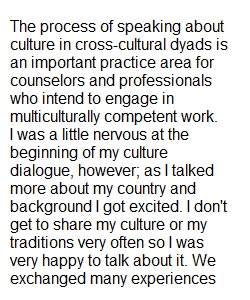


Q Over that past few weeks you all have been engaging in dialogue about cultural experiences and your own salient cultural factors with your peers. The process of speaking about culture in cross-cultural dyads is an important practice area for counselors and professionals who intend to engage in multiculturally competent work. As I read through your sketches and listen to your dialogues, I notice a few things: 1. You all have unique cultural factors that may not seem as salient until you think more deeply about them. This is important as some cultural factors are more salient to individuals who are adjusting to the impact of the cultural factor in their lives. Having awareness of identity helps you to see someone else's culture even if it is not as salient for you. 2. Many of you talked about how the cultural factors only scratch the surface of a person's full identity and does not include personality and experiential factors that come with age and generational experiences. I think this is an important statement as much of these factors impact individuals' experiences without even having an understanding of the personality or who the actual person really is. 3. Some of you spoke about the impact of the nondominant factors despite the identification of other dominant groups. And that the impact of one nondominant group identity outweighs the potential benefits of the multiple dominant group identities.
Q These are all very important and insightful thoughts about the culture and various identities. This week I would like you to consider how it was to dialogue about your cultural identities and these noted complexities within culture with your peers. Was it difficult to talk about your culture during your cultural dialogues? Was it very easy for you? Did you speak with individuals with different (at least 2) cultural identity factors (age, gender, religion, sexual orientation, ethnicity, nationality, etc) than yourself? What did you learn? Share your experience of your dialogues with your group mates and what it meant to learn to speak about your and others cultural experience. For this week’s discussion, I also encourage you to consider 2-3 individuals outside of our class that you would like to interview. As you consider your 2-3 people for your cross cultural interview, list what you expect to learn in your interactions with your chosen interviewee? Discuss which topics or aspects of communication (verbal or nonverbal) may be challenging between you and your interviewee? Discuss which cultural experiences may impact your interviewee's life on a daily basis (discrimination? prejudice? power? privilege?)
View Related Questions